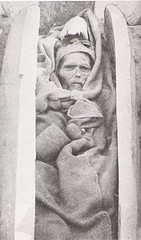Can’t decide what to name your border town? Why not split the difference? Near the line between Idaho and Nevada sits a town dubbed Idavada. Similarly, there’s a Tennga between Tennessee and Georgia, and a Virgilina between Virginia and North Carolina.
This can get confusing if both states have the same idea. There are two Texarkanas, one in Texas and one in Arkansas. And Delaware and Maryland both have a Delmar and a Marydel, for a total of four towns.
Finally, for the pathologically indecisive, there’s Cal-Nev-Ari, which is in southern Nevada near California and Arizona. It’s not far from Utah, either, but apparently amity has its limits.
04/17/2022 Another! Kenova, West Virginia, is named for the three bordering states Kentucky, Ohio, and Virginia. (Thanks, Alan.)




